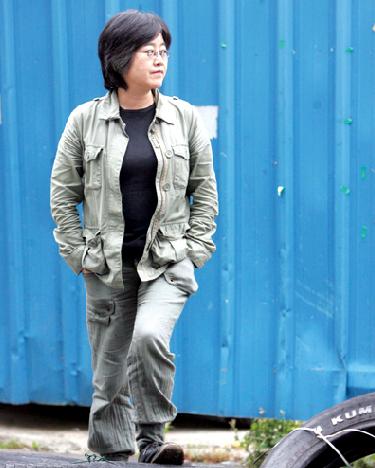
“For me, movies are tools of communication that can touch people’s minds. I want to produce films that embrace busy modern people who are sick of problems in their lives,” Lee said.
Originally, Lee had various jobs, such as a talk show host and a part-time lecturer as an active feminist. She majored in German Language and Literature at Korea University and entered Ewha Graduate school in 1990. After graduation, she became an expert at being a public-friendly feminist who can host a talk show or give a lecture.
Then her life changed unexpectedly. She decided to become a movie director after participating in a movie-making workshop sponsored by MediAct, just for experience. She applied to the Korea Academy of Film Arts (KAFA) in 2006 with her portfolio and her first five-minute film. She was accepted and made her debut as a special case. After a two-year-long battle with herself, she was selected as the member of the long film production course at the academy in 2008, after when she produced “The Day After.”
The main character of the film is Kim Bo-young. She is a 40-year-old divorcee who is emotionally stressed days after her divorce. She acts coldly to her friends who tries to sympathize with her and her family. One day, her father gives Kim unexpectedly warm advice - just to keep doing her best as she always has done before. This message gives her comfort and she remembers that she has those who support her, and help her to live a day at a time, and the day after.
“I wanted to depict the growth of an adult - a 40-year-old divorcee who begins to embrace herself after realizing that she is okay as she is and her family still believes in her.”
Lee wanted her movie to be so natural that viewers could see it as if it is actually happening in their neighborhood. Therefore, she decided to shoot her film in places familiar to Lee with her family and friends acting as themselves.
For example, Lee’s daughter played the main character’s daughter depicting her own personality.
“In one scene, my friend had to express anger toward the blunt main character Kim, who is largely based on me. Since the actress acted so bluntly and cynically, my friend got really angry and she didn’t have to put on an act, which was exactly what I was aiming for,” Lee said.
Since Lee tried to capture natural moments, allowing the actors to be absorbed into a scene and lead it by themselves, she did not write the stage cues or the lines in detail. When she told her mentor and her staff that details could change according to the performers’ feeling, they were confused at first.
“When I first saw the scenario, I couldn’t tell what exactly she wanted to talk about. However, I knew this movie was autobiographical and Lee could link the scenes together in the end,” said Pak Gi-yong, the former president of the KAFA and her film mentor.
By participating in the BIFF, Lee’s movie was introduced to various kinds of audiences. She was amazed how people different from herself empathized with it.
“Audiences I met at the BIFF and Koreans, too, found the same scenes funny,” Lee said. “Also, people other than Korean females understood this film in their own ways, like thinking of their own problems and how they deal with them.”
These days, Lee is planning to shoot a documentary in which three homeless girls appear. She is also interested in stories of children of divorced parents like her daughter.
“I won’t rush to become a good film director. I will slowly work on making films with my friends or family to capture moments of our daily lives,” Lee said.

